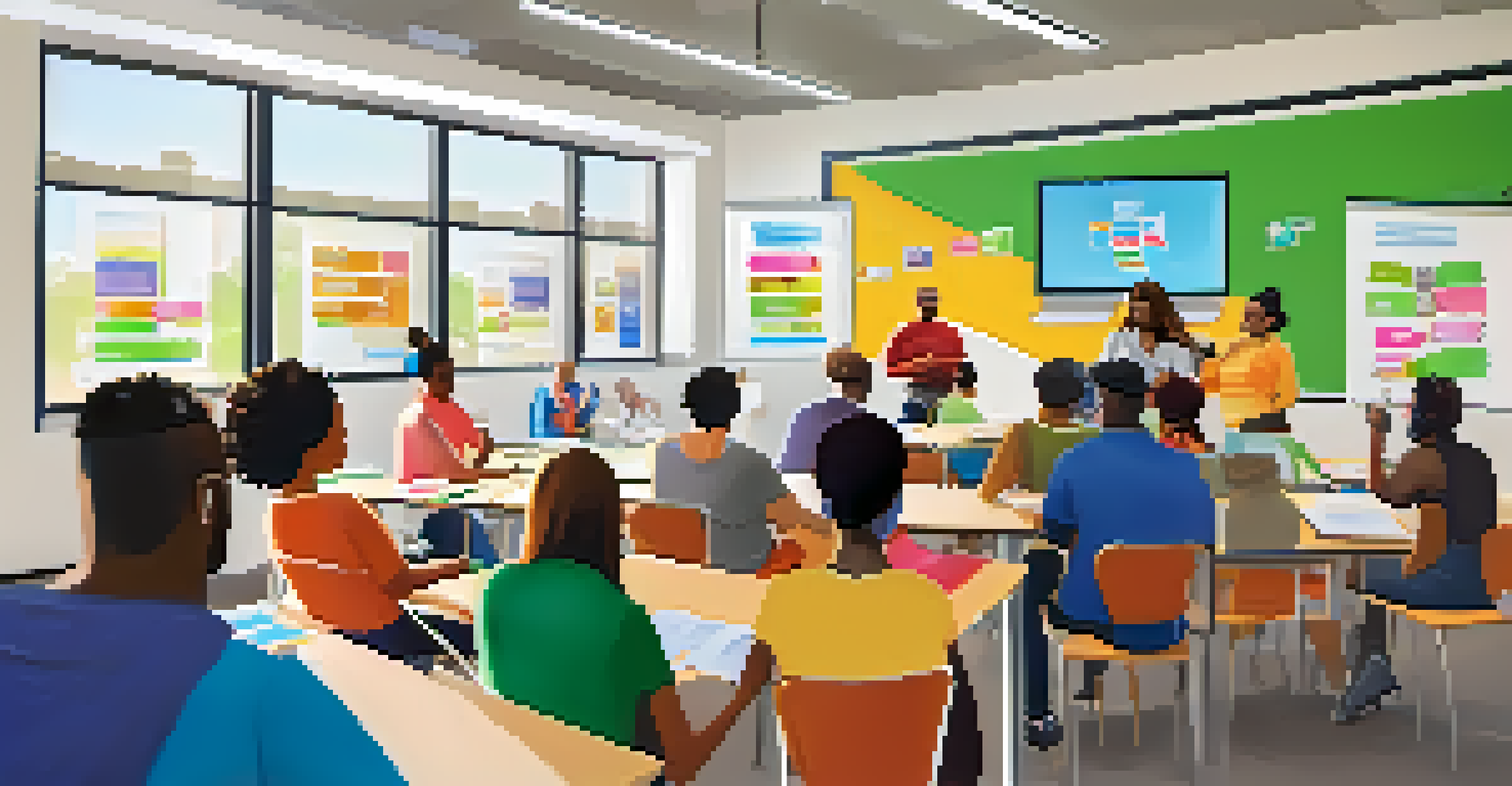Public Libraries as Educational Resources in Georgia State

The Role of Public Libraries in Education
Public libraries in Georgia serve as vital educational resources, bridging gaps in information access for all ages. They provide a welcoming space where individuals can explore various subjects—from history to technology—at no cost. Libraries are not just about books; they host workshops, lectures, and activities that foster lifelong learning.
A library is not a luxury but one of the necessities of life.
For students, these libraries offer a quiet place to study and access to essential resources, including textbooks and research materials. Additionally, they often provide tutoring programs that enhance academic performance. Many libraries also collaborate with schools to support curriculum needs, ensuring students have the tools they need to succeed.
The community aspect of public libraries further enhances their educational role. By bringing people together for discussion groups and educational events, libraries cultivate a culture of learning and curiosity. This creates an environment where knowledge isn't just shared; it's celebrated.
Access to Technology and Digital Resources
In today's digital age, access to technology is crucial for education, and Georgia's public libraries are stepping up. They offer free access to computers, high-speed internet, and various software programs, making sure everyone can connect and learn. This is particularly important in underserved areas where technology may not be readily available.

Moreover, libraries provide digital resources like e-books, online courses, and educational databases. This allows patrons to learn at their own pace and dive into topics that interest them. For example, platforms like Lynda.com or OverDrive can help users acquire new skills or enjoy literature without needing to purchase expensive subscriptions.
Libraries Enhance Access to Education
Public libraries in Georgia provide essential resources, workshops, and a supportive environment that bridge educational gaps for all ages.
By integrating technology into their services, libraries empower individuals to harness the power of the internet for educational purposes. This not only enhances learning opportunities but also prepares patrons for a world where digital literacy is increasingly important.
Workshops and Educational Programs Offered
Public libraries in Georgia frequently host workshops and educational programs tailored to different age groups. These can range from reading programs for young children to advanced technology classes for adults. By offering such diverse programming, libraries cater to the varying needs of their communities.
Public libraries are essential to a democratic society, providing access to information and resources for all.
For instance, storytime sessions for toddlers spark early literacy skills, while STEM programs encourage critical thinking among older children. Adult education workshops might cover topics such as resume writing, job searching, or financial literacy, providing valuable skills that can directly impact patrons' lives.
These programs often involve collaboration with local experts, ensuring that the content is relevant and engaging. As a result, participants not only gain knowledge but also build connections within the community, making learning a shared journey.
Support for Lifelong Learning and Career Development
Public libraries understand that education doesn't stop after formal schooling; it continues throughout life. They provide resources that support lifelong learning, offering courses and workshops that encourage personal and professional growth. This commitment to ongoing education helps individuals adapt to a rapidly changing job market.
For job seekers, libraries often host career development programs that include resume writing workshops, interview preparation, and networking events. These resources can be invaluable for those looking to enhance their skills or change careers. Libraries also partner with local businesses and organizations to facilitate job fairs and recruitment events.
Technology Empowers Learning
By offering free access to computers, digital resources, and online courses, libraries ensure everyone can engage with technology for their educational needs.
By fostering a culture of lifelong learning, public libraries become essential partners in personal development. They empower individuals to pursue their interests and career goals, making education a continuous journey rather than a destination.
Community Engagement and Collaboration
Public libraries in Georgia are more than just repositories of books; they are community hubs that promote engagement and collaboration. They often partner with local schools, nonprofits, and businesses to create programs that address community needs. These partnerships enhance the educational offerings available to residents.
For example, a library might collaborate with a local school district to provide after-school tutoring services or summer reading programs. These initiatives not only support students but also strengthen community ties. By working together, libraries and local organizations create a network of support that benefits everyone.
Furthermore, community events, such as author talks, cultural celebrations, and workshops, invite participation from diverse groups. This fosters a sense of belonging and encourages lifelong learning. In this way, libraries play a significant role in shaping vibrant, educated communities.
Promoting Literacy Across All Ages
Literacy is the foundation of education, and public libraries in Georgia are committed to promoting it for all ages. They offer a variety of programs aimed at improving reading skills, from early literacy initiatives for children to book clubs for adults. These programs help individuals develop a love for reading, which is essential for lifelong learning.
In addition to traditional literacy, libraries also focus on digital literacy, teaching patrons how to navigate technology and access online resources. This is critical in an age where information is often found online, and being able to discern credible sources is vital. By providing these skills, libraries ensure that everyone can participate in the digital world effectively.
Community Collaboration Drives Growth
Public libraries foster partnerships with local organizations to create programs that address community needs and promote lifelong learning.
By promoting literacy, public libraries empower individuals to engage with the world around them. They help patrons become informed citizens who can think critically and advocate for themselves, ultimately contributing to a more educated society.
Conclusion: The Future of Libraries in Education
As we look ahead, the role of public libraries in education will only continue to grow. With advancements in technology and shifts in educational needs, libraries are adapting to meet the demands of their communities. They are poised to remain essential resources in supporting education and lifelong learning in Georgia.
The commitment to providing access to information, technology, and programs ensures that libraries stay relevant and impactful. By fostering partnerships and community engagement, they can further enhance their educational offerings. In this way, libraries can serve as catalysts for change, driving educational initiatives that empower individuals.

Ultimately, Georgia's public libraries exemplify the idea that education is a shared responsibility. They create inclusive environments where everyone can learn, grow, and thrive, making them invaluable assets to the state's educational landscape.